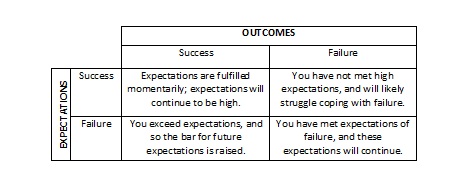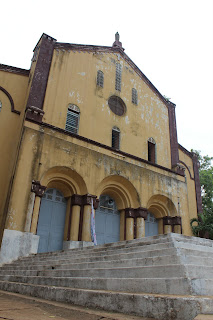This is a blogpost I hope a lot of my readers will be able to relate to, and take something from. I know it’s great hearing about my adventures in Benin, but with life kind of settling in this past week, I thought it would also be helpful if I addressed a topic I’ve been meaning to write about for a while now – failure. A couple weeks ago, I got a rejection letter from McGill University telling me I was not admitted into Neuroscience, the program I had wanted to major in. I had set a goal at the beginning of the year to gain entry to it, and I failed. The following is by no means concrete advice – it’s just me organizing my thoughts on how I think would be best to approach failure, and everyone copes somewhat differently. So, without further ado, let’s get started.
Preparing for Failure
I know it sounds silly at first, but preparing for failure is one of the most important things you can do. The fact that everyone fails at something or another at some point in their life is unavoidable. In preparing for failure, you can often cushion the blow when you don’t reach your goal, allowing you to bounce back quicker and set goals all over again.
Preparing for failure involves thinking long and hard about expectations. When I say that it is inevitable that everyone fails at something, I’m not advocating that you expect to fail. Just the same, you should never expect to succeed. I’ve come to a conclusion about expectations through reflection and experience. To make this a little easier to show than a big fat paragraph, I’ve summarized my thoughts into this table below:

As you can tell I’m not a huge fan of expectations. Now, an opposing view to my opinion might go something like, “But Gaurav, what about when you are expected to fail, but then you go ahead and succeed, isn’t that a positive thing?” Yes, that is a positive thing, but it happened in spite of the expectation, rather than because of it. Expectations are often thought of as a type of motivation, but I’m of the opinion that that motivation comes from the final stage of success or failure, and motivation’s correlation with expectations is purely coincidental. I will get into more about why I’ve come to this conclusion, but I’m getting ahead of myself.
The point is that in order to best prepare for failure, you must temper expectations. Notice that I used the word “temper” instead of “eliminate”. It is human nature to hold expectations, so unfortunately it is something we all have to deal with. When you are working towards a goal, try to imagine both scenarios and your reaction to either attaining your goal or falling short. So, preparing for failure means knowing that it is possible, thinking about that scenario, and imagining how you will react.
Coping With Failure
No matter how much you prepare for failure, once it hits, it is never easy to take. Coping is an important stage of failure because oftentimes emotions ride high after you set a goal and you are unable to accomplish it. If you don’t take some time to understand and work through these emotions, they can often complicate understanding or learning from your failure, or even worse linger and settle as negativity.
The first thing is to accept the onslaught of emotions. When I got the news that I didn’t get into Neuroscience, I was devastated. My emotions went from a plunging feeling of despair deep down inside of me, to being angry at the selections committee, and then shortly afterwards being angry with myself. If you repress these emotions and try to instead immediately focus on the positives of a failure, you might feel better in the short term, but eventually those feelings will resurface. It’s kinda like when Homer Simpson had those wart things popping out of his neck that he pushed back in every time he was angry, only to eventually lose it. Learn from the Simpsons, and don’t let this happen to you.
As important as allowing yourself to feel negative after a failure is, you must move past this stage. Sometimes this just happens naturally, but it can also be difficult to do when you suffer a major setback. Personally, I find talking it out with someone else is the best way to get over feeling negative. Other people often provide good insight or opinions, but mostly, just the fact that they are there to listen is the best part. In my future studies, I want to learn exactly why getting things off your chest and sharing your thoughts with other people makes you feel so much better, because it is interesting how effectively it works.
Another thing to consider is whether your failure is actually something to be upset about. It’s interesting to note that feelings associated with different types of failure are very culturally dependent. In our individualist culture, we value standing out from the crowd and being individually successful. However, in some collectivist cultures, if you failed at being personally successful, this would be viewed as an opportunity to avoid the shame of standing out from the crowd and leaving behind your friends and family. Sometimes seeing things from another perspective, and noticing just how arbitrary the feelings you associate with failure are, can help you feel better as well.
Analyzing Failure
After you have coped with your failure, you are in the state of mind to analyze it. Why should we analyze our failures? It’s pretty self explanatory: you have to understand what went wrong if you want to prevent it in the future. If you begin this stage too early while you are still highly emotional, pointing fingers and making excuses can become a part of your analysis, rendering your failure difficult to learn from.
So how exactly can you analyze your failure? Well firstly, it is important to gauge how much responsibility you hold in your failure. For example, in failing a class you should take a lot more responsibility for your result than if you failed to win a multimillion dollar lottery. To make this judgement, you need to understand what factors played into your failure, and group them as within your control and out of your control.
Let’s take Joe for example, an imaginary figure who fails his physics class. After failing the course, Joe determines a list of core factors that contributed to his failure.
Factors
1. Getting sick a day before the final exam
2. Not turning in a couple of homework assignments
3. His teacher was a harder marker than other physics teachers
4. Never asking questions in class or going for extra help even though he didn’t understand
5. It was his birthday the weekend before his midterm
Joe came up with these factors by comparing the things he did differently in this class with the other classes he was in during the same time, as well as the physics courses he had completed in the past. He decides that factor 1 was out of his control, because he didn’t do anything before his exam that would make him more vulnerable to getting sick than normal. He also decides that factor 3 was out of his control, because he didn’t choose his instructor. Finally he decides that factor 5 was out of his control because he doesn’t control when the midterms are placed and it was just bad luck. The other two, he admits, were his fault.
Now, many of you might see that factor 5 is not really out of his control. Although the midterm was right after his birthday, he could have started studying for his exam earlier since he knew his birthday was coming, or he could have put off the celebration for a week until his midterm was over. All of this to say that you should often check your groupings with someone else, just to make sure you aren’t too lenient or too harsh on yourself.
Anyways, now that Joe has grouped the factors, he has to decide what he could have done about the things that were in his control. There is no use worrying about factors beyond his control because usually they are exceptional and won’t recur on a regular basis. He can’t do anything about them! To find a better model for the things he needs to approve on, Joe should look towards other times he has succeeded at something similar, or how other people around him did well in his Physics course. Personally, if I usually do well at something and there is a time when I fail, I prefer focusing on my own experiences of past success because sometimes what works for others isn’t what works for me. Regardless of the situation, keeping an open mind when talking to others will only benefit you in the end, giving you more avenues to learn from your mistakes.
Moving On
After feeling negative, analyzing your mistakes and then learning from them, you must prepare to move on. Setting goals after a failure is one of the most important things you can do. In my case, my goal is to re-apply for Neuroscience in the coming year with better marks and a stronger essay, and take a second crack at getting in. In Joe’s case, his goal might be to retake the physics course and ace it, or to choose a different course and make up for the fail with an excellent mark. Only by setting new and attainable goals will you have the motivation to succeed, and the opportunity to use the knowledge you have acquired from your previous failure. Now although this post is about dealing with failure, this paragraph is also perfectly applicable to success. After you bask in your success a little bit and go over the things that made you successful, you’ve got to set a new goal to put what you’ve learned to use.
Finally I wanted to revisit the idea that expectations do NOT provide motivation. Expectations are passive and encourage being passive, but motivation is active and so is goal setting. For example, if an Olympic high jumper sets a goal to clear a 3m bar, they will train harder and harder to achieve that goal. However, if the jumper develops an expectation that they can clear a 3m bar easily, or even the expectation that they will never be able to make a 3m jump, they might train less vigorously or might stop training altogether because they already have an expectation. I hope this example explains how goal setting encourages motivation, and expectations can discourage motivation.
I hope this post is of value to some of my readers – it certainly helped me organize my thoughts on success and failure. Although I don’t expect anyone to take notes on this and then make a list of factors to analyze their failures every time, I broke it down with the hope that going through this process might provide a logical framework for most situations. I personally have never written out a list of factors (although it is a good idea now that I think about it), but I definitely go over that stuff in my head when I’m reflecting on my experiences. Anyways, here’s to hoping you set goals and work hard enough that you don’t have to think about this post when it comes to the things that matter most to you.
Best of luck!

















